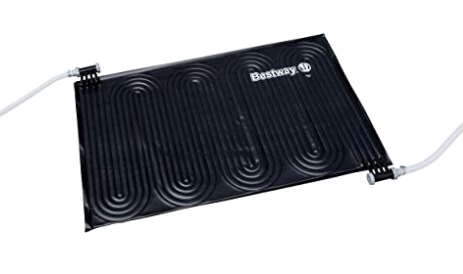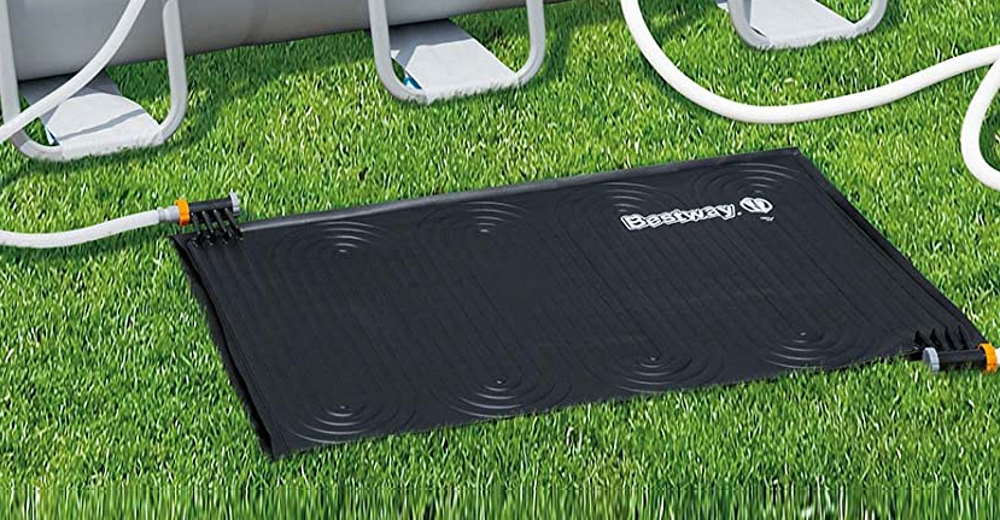Solar pool heaters are an excellent way to keep your pool warm and extend your swimming season without relying on expensive and environmentally damaging fossil fuels. In this article, we will explore how solar pool heaters work, their benefits, and how to calculate their strength based on pool volume and outside temperature.
These are a great choice for heating water either in-ground or above-ground pools. If you’re considering installing a solar pool heater, before doing that, make sure to consult with a professional installer. That way you’ll know how to select the right size and type of system for your specific pool and climate.
How do Solar Pool Heaters Work?
Solar pool heaters use energy from the sun to warm the water in your pool. They consist of a series of panels, typically mounted on the roof of your home or a nearby shed, that collect the sun’s energy and transfer it to the water in your pool.


Solar pool heaters work best in sunny climates where there is ample sunlight year-round. However, even in less sunny areas, they can still be effective, especially during the summer months.
The panels are made of a material that absorbs the sun’s energy and converts it into heat. This heat is then transferred to the water in your pool through a series of pipes or channels. As the water passes through the panels, it is warmed by the sun’s energy before returning to the pool.
In-ground and Above-ground Swimming Pools
Solar pool heaters are suitable for both in-ground and above-ground pools. The installation and sizing requirements may vary slightly depending on the type of pool you have, but in general, solar pool heaters can work well for any type of pool.
For in-ground pools, solar panels are typically installed on the roof of a nearby building or on a mounting structure adjacent to the pool. The panels are connected to the pool’s filtration system and use the existing pool pump to circulate the water through the panels and back into the pool.
For above-ground pools, solar panels can be mounted on the ground or on a nearby structure such as a deck or shed. The panels are connected to the pool’s filtration system using hoses and adapters, and the water is circulated through the panels using a separate solar pump.
Overall, solar pool heaters are a versatile and effective option for both in-ground and above-ground pools. If you’re considering installing a solar pool heater, be sure to consult with a professional installer to ensure that you select the right size and type of system for your specific pool and climate.
Solar Panel Heater vs Electric Pool Heater
When it comes to heating a pool, there are two main options: solar panel heaters and electric heaters. Here are some of the key differences between the two:
Cost – In terms of initial cost, solar panel heaters are typically more expensive than electric heaters. However, over the long term, solar panel heaters are generally more cost-effective, as they rely on free energy from the sun and have very low operating costs.
On the other hand, electric heaters can be less expensive to install initially, but their ongoing operating costs can be quite high, especially if you use them frequently or have a large pool.
Environmental Impact – Solar panel heaters are a much more environmentally friendly option than electric heaters. They do not produce any emissions or pollution, and they rely on renewable energy from the sun.
Electric heaters, on the other hand, rely on electricity from the grid, which is often produced from fossil fuels. This means that electric heaters can contribute to greenhouse gas emissions and other environmental problems.
Efficiency – In terms of efficiency, solar panel heaters are generally less efficient than electric heaters, especially in areas with less sunlight. However, solar panel heaters can still be effective in most climates and can be a good option for people who are willing to trade some efficiency for the environmental and cost benefits of solar power.
Electric heaters are generally more efficient than solar panel heaters, but their efficiency can be affected by factors such as the size of the heater and the size of the pool. Additionally, because electric heaters rely on electricity from the grid, their efficiency can be affected by power outages or other disruptions.
Maintenance – Both solar panel heaters and electric heaters require some maintenance to keep them working properly. Solar panel heaters may require periodic cleaning to remove dirt and debris from the panels, while electric heaters may require maintenance of the heating elements or other components.
Overall, the choice between a solar panel heater and an electric heater will depend on your individual needs and preferences. If you are looking for an environmentally friendly and cost-effective option, a solar panel heater may be the best choice. If efficiency and quick heating are your top priorities, an electric heater may be a better option.
What are the Benefits of Solar Pool Heaters?
Solar pool heaters offer several benefits over traditional pool heaters. First, they are much more environmentally friendly. Unlike traditional pool heaters that rely on fossil fuels, solar pool heaters use clean, renewable energy from the sun.
Second, solar pool heaters can save you a significant amount of money on your energy bills. While the initial cost of installing a solar pool heater may be higher than a traditional pool heater, the ongoing costs are much lower, as you are not paying for fuel or electricity to run the heater.
Finally, solar pool heaters can extend your swimming season, allowing you to enjoy your pool for longer periods of time. With a solar pool heater, you can start swimming earlier in the spring and continue swimming later into the fall.
How to Calculate Solar Pool Heater Strength
To determine the strength of a solar pool heater, you will need to consider the volume of your pool and the outside temperature. The strength of a solar pool heater is measured in BTUs (British Thermal Units) per hour.
The formula for calculating the BTUs required to heat your pool is as follows:
BTUs per hour = Pool Volume (gallons) x Temperature Rise (°F) x 12
For example, let’s say you have a 20,000-gallon pool and you want to increase the temperature by 10 degrees Fahrenheit. Using the formula above, you would need a solar pool heater with a strength of:
20,000 x 10 x 12 = 2,400,000 BTUs per hourKeep in mind that this formula provides an estimate and that other factors, such as the amount of direct sunlight and the size and efficiency of the solar panels, can also affect the strength of the solar pool heater.
Conclusion
Solar pool heaters offer an eco-friendly and cost-effective way to heat your pool and extend your swimming season. By understanding how solar pool heaters work and how to calculate their strength, you can choose the right system for your pool and enjoy a warm, inviting pool all season long.
